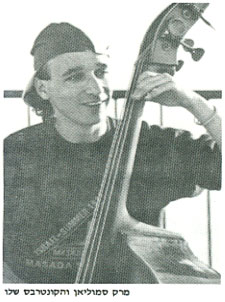Making a Sound out of Dyslexia
An interview with the musician Mark Smolian
Article by Niva Gal
Many of the participants of the Jazz Festival in Eilat will be certainly be surprised to hear that in the band "Zviot", who won first place at the festival, there is an instrumentalist and musician that even today has trouble writing in general and writing notes specifically. Mark Smolian, who plays contra-bass in the band, succeeded in defeating dyslexia.
Mark was born in London and luckily, as he puts it, was the youngest of four children in the family, such that his parents already has experience in raising children.
His problems started with learning to read and write. "Mom would help me a lot. I developed an amazing memory. I would learn entire pages by heart, but I couldn't always keep up with the workload. At school, the teachers didn't understand how an intelligent child like me isn't able to read or write. Just thanks to a teacher who was a friend of the family they treated me with a certain amount of understanding.
When I moved to a different school, the troubles began. There, there they didn't know how to deal with me because of a lack of knowledge of the problem of dyslexia. The teachers didn't understand what was happening.

Thanks to my mother's awareness, it was suggested that maybe there's a deeper problem here. She turned for help to the school principal who was especially sensitive and he referred us to the hospital for more thorough tests. As a result of this, we got to a special school that was run like a private school at the home of the principal, Misis Hartali. Together with me, there were another 12 children with different problems like dyslexia, hyperactivity, attention-deficit, and more.
It was fun to learn there. The studies were combined with other informal games and activities. We learned to make for ourselves meals and to be more independent. The studies and treatment were very personal with a lot of attention and patience. This setting put me on my feet and there I basically learned to read and write, even though today I still write with a lot of mistakes and I mix up letters. When I go back over the reading an additional time, I definitely pick up on what's written. Today, you can say, I really enjoy reading.
I started playing musical instruments when I was about 8 or 9 years old. My parents wanted me to learn to play piano. I also wanted to learn but it was hard for me to read the notes, so I was forced to give up on playing instruments." But the love for music with Mark was very strong and at 12-years-old, because of a friend who played guitar, Mark took out all of his pocket change and bought a guitar. After a year, with the money from his bar mitzvah he bought a more advanced guitar and then he started playing seriously. "It's tough to say if it's because I'm dyslexic, but in a natural way I focused on music".
Even today, learning notes is difficult for him. Together with this, Mark currently writes music in five keys. As a result of his awareness to his difficulties, he checks himself again and again. Even so, he has his opposing help, his wife, who is also a musician and checks his writing. "The problem of dyslexia" says Mark, "Caused me to be spontaneous in writing music, therefore most of the music that I play and write is in the jazz style. Currently, I play in the band "Zviot". In the band, there are four musicians who play guitar, contra-bass, drums, and clarinet. We perform with original material that we write ourselves. We've put out a disc called "Zviot" which received very positive response in Israel and abroad.
In the army, Mark served in the Paratrooper's unit (Destroyers troop). When he joined the army, he requested to be tested verbally since he was a new immigrant. By means of this, he was able to conceal his problem of dyslexia. Throughout his service, his reading and writing problems didn't bother him. Friends always helped him. Mark admits that he didn't try especially hard to learn Hebrew and that was because of his past trauma of trying to learn to read and write. His luck was that friends who encouraged him always surrounded him. The problem was the dominant part of his or his parents' lives. He never felt that he was out of the ordinary.
"A long time ago I learned to tell people that I have a problem with writing and when I give a letter to someone I tell them from the beginning that if they're not intending to be considerate with my writing problems, then there's no reason to read what I wrote. When writing important letters, I ask my wife to check them for me. By the way, in the past she also didn't understand why it's so hard for me to read notes. "Interesting", says Mark, "that even though reading and writing are the weak part with me, in the last year and a half where I work mainly on writing scenes, which comes as a result of writing music for films, I get a lot of satisfaction out of this."
Winning at the Jazz Festival in Eilat gave Mark and his band more encouragement on their way to success and fame.
Taken from "To be like everyone", Nitzan Newsletter, No. 3, January 1988